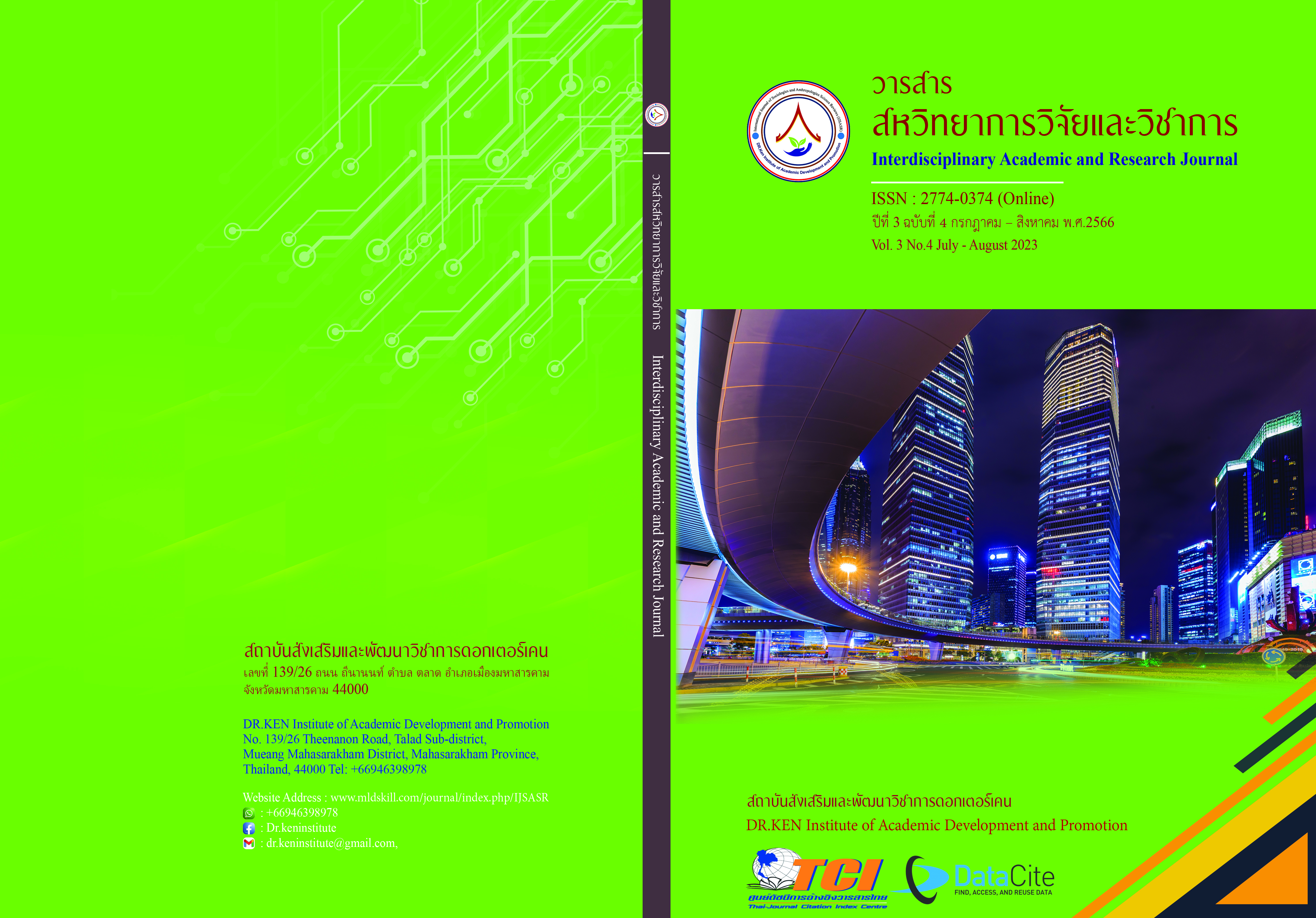องค์กรทางการศึกษาที่ยั่งยืน: กระบวนทัศน์การบริหารจัดการศึกษา 4.0 ที่มีประสิทธิผลต่อคุณภาพการจัดการศึกษาขั้นพื้นฐาน
DOI:
https://doi.org/10.14456/iarj.2023.211คำสำคัญ:
องค์กรทางการศึกษาที่ยั่งยืน; , กระบวนทัศน์การบริหารจัดการศึกษา 4.0; , ประสิทธิผล; , คุณภาพการจัดการศึกษาขั้นพื้นฐานบทคัดย่อ
กระบวนทัศน์การจัดการศึกษาเป็นสิ่งสำคัญในการพัฒนาคุณภาพองค์กรทางการศึกษาให้สัมฤทธิ์ผล การวิจัยนี้มีวัตถุประสงค์ (1) เพื่อศึกษาวิเคราะห์กระบวนทัศน์การบริหารจัดการศึกษา 4.0 ที่มีประสิทธิผลต่อคุณภาพการจัดการศึกษาขั้นพื้นฐานบนฐานองค์กรทางการศึกษาที่ยั่งยืน (2) เพื่อวิเคราะห์องค์ประกอบเชิงยืนยันของกระบวนทัศน์การบริหารจัดการศึกษา 4.0 ที่มีประสิทธิผลต่อคุณภาพการจัดการศึกษาขั้นพื้นฐานบนฐานองค์กรทางการศึกษาที่ยั่งยืน และ (3) เพื่อศึกษาทิศทางของการบริหารจัดการศึกษา 4.0 ที่มีประสิทธิผลต่อคุณภาพการจัดการศึกษาขั้นพื้นฐานบนฐานองค์กรทางการศึกษาที่ยั่งยืน ซึ่งเป็นการวิจัยแบบผสมผสานวิธีในการศึกษากับสำนักงานเขตพื้นที่การศึกษาประถมศึกษาและมัธยมศึกษา จำนวน 225 เขต การเก็บรวบรวมข้อมูลเชิงคุณภาพจากการศึกษาเอกสาร และแบบสัมภาษณ์ กับ 225 ผู้ให้ข้อมูลสำคัญ คือ ผู้อำนวยการเขตพื้นที่การศึกษา ในภาคส่วนเชิงปริมาณจากการสำรวจด้วยแบบสอบถามกับ 480 กลุ่มตัวอย่าง คือผู้อำนวยการโรงเรียน และครู ของการดำเนินการศึกษา วิเคราะห์ข้อมูลด้วยสถิติพื้นฐานและการวิเคราะห์องค์ประกอบเชิงยืนยัน (CFA) ผลการศึกษาพบว่า กระบวนทัศน์การบริหารจัดการศึกษา 4.0 มี 10 องค์ประกอบ ที่เป็นฉากทัศน์ รวมไปถึง ความเป็นผู้นำทางการศึกษาที่ยั่งยืน การบริหารจัดการศึกษาเชิงกลยุทธ์ที่ยั่งยืน การบริหารจัดการประสิทธิผลคุณภาพเพื่อความยั่งยืน การจัดการศึกษาเพื่อความมั่นคง การพัฒนาคุณภาพการศึกษาเพื่อความยั่งยืน การสร้างประสิทธิภาพบุคลากรทางการศึกษาที่มีศักยภาพสูงเพื่อความยั่งยืน การสร้างโอกาสการเข้าถึงบริการทางการศึกษาที่มีมาตรฐานและลดความเหลื่อมล้ำเพื่อความยั่งยืน การบริหารจัดการศึกษายึดการมีส่วนร่วมเพื่อความมั่นคง การสร้างวัฒนธรรมองค์กรการศึกษาเพื่อความยั่งยืน โดยองค์ประกอบเชิงยืนยันของกระบวนทัศน์การบริหารจัดการศึกษา 4.0 มีความสอดคล้องกับข้อมูลเชิงประจักษ์อย่างมีนัยสำคัญทางสถิติที่ระดับ 0.01 และทิศทางการบริหารจัดการศึกษา 4.0 ทั้งนโยบายการบริหารงานทางการศึกษา สมรรถนะผู้บริหารและครูผู้สอน หลักสูตรและการจัดการเรียนรู้ การจัดสภาพแวดล้อมที่เอื้อต่อการเรียนรู้ ที่มีประสิทธิผลต่อคุณภาพการจัดการศึกษาขั้นพื้นฐานบนฐานองค์กรทางการศึกษาที่ยั่งยืน
เอกสารอ้างอิง
กนกอร สมปราชญ์. (2555). การบริหารเชิงกลยุทธ์. กรุงเทพฯ: ซัคเซสมีเดีย.
กระทรวงศึกษาธิการ. (2559). การปรับกระบวนทัศน์ (Paradigm shift). กรุงเทพฯ: กระทรวง.
เกษม เมษินทรีย์. (2559). โลกเปลี่ยน ไทยปรับ. กรุงเทพฯ: กระทรวงศึกษาธิการ.
เกษม วัฒนชัย. (2559). การพัฒนาคุณภาพการศึกษายุคไทยแลนด์ 4.0. กรุงเทพฯ: อรุณการพิมพ์.
ฉลาด จันทรสมบัติ. (2554). การมีส่วนร่วมของชุมชนในการจัดการศึกษาเพื่อพัฒนาท้องถิ่น. วารสารการบริหารและพัฒนา มหาวิทยาลัยมหาสารคาม, 1 (4), 178.
ชุมศักดิ์ อินทร์รักษ์. (2562). กระบวนทัศน์การพัฒนาผู้บริหารการศึกษาและผู้บริหารสถานศึกษาในศตวรรษที่ 21. วารสารการบริหารการศึกษา มหาวิทยาลัยศิลปากร, 10 (2), 1-10.
ดาราวรรณ สุขคันธรักษ์ และประเสริฐ อินทร์รักษ์. (2557). ยุทธศาสตร์การขับเคลื่อนการบริหารงานวิชาการของสถานศึกษาขั้นพื้นฐานสู่ประชาคมอาเซียน. วารสารวิชาการ Veridian E-Journal, 7 (1), 58- 72.
ธีระ รุญเจริญ. (2557). ความเป็นมืออาชีพของผู้บริหารการศึกษา. พิมพ์ครั้งที่ 3. กรุงเทพฯ: ข้าวฟ่าง.
พรชัย เจดามาน, สนิท ตีเมืองซ้าย, สุทธิพงศ์ หกสุวรรณ์ และประมุข ศรีชัยวงษ์. (2563). การพัฒนาคุณลักษณะภาวะผู้นำแบบเหนือชั้นอย่างยั่งยืนที่ส่งผลต่อความพึงพอใจในงานและความผูกพันองค์กรของบุคลากรทางการจัดการศึกษา. วารสารมนุษย์ศาสตร์และสังคมศาสตร์: มหาวิทยาลัยนครพนม, 13 (1), 71- 82.
พัชราภรณ์ ดวงชื่น. (2563). การบริหารจัดการศึกษารับความปกติใหม่หลังวิกฤตโควิด–19. วารสารศิลปะการจัดการ, 4 (3), 784-785.
พันวนา พัฒนาอุดมสินค้า. (2557). รูปแบบกระบวนการบริหารที่ส่งผลต่อการพัฒนาคุณภาพการศึกษาของสถานศึกษาขั้นพื้นฐาน. วารสารมหาวิทยาลัยนครพนม, 3 (4), 105- 119.
ไพรฑูรย์ พิมดี พรชัย เจดามาน เผชิญ กิจระการ และคณะ. (2560). การพัฒนาการศึกษาภายใต้กรอบประเทศไทย 4.0 สู่ศตวรรษที่ 21. วารสารครุศาสตร์อุตสาหกรรม, 16 (2), 92-98.
มนัสวี ศรีนนท์. (2558). การวิเคราะห์การบริหารการศึกษาไทยในศตวรรษที่ 21 ด้วยทฤษฎีการบริหารการศึกษาเชิงระบบ. วารสารศึกษาศาสตร์ มมร. คณะศึกษาศาสตร์ มหาวิทยาลัยมหามงกุฎราชวิทยาลัย, 3 (2), 51-57.
วิจารณ์ พานิช. (2554). การศึกษาที่มีคุณภาพสำหรับศตวรรษที่ 21. เอกสารประกอบการบรรยายในกำหนดการประชุมวิชาการครั้งที่ 6 สมาคมเครือข่ายพัฒนาวิชาชีพอาจารย์และองค์กรระดับอุดมศึกษาแห่งประเทศไทย (ควอท.).
วิทยา ด่านดำรงกุล. (2556). การบริหารจัดการ (Management). กรุงเทพฯ: เธอร์ดเวฟ เอ็ดดูเคชั่น.
สำนักงานคณะกรรมการการศึกษาขั้นพื้นฐาน. (2560). การจัดการศึกษาในเกณฑ์คุณภาพของโรงเรียนมาตรฐานสากล. กรุงเทพฯ: สำนักงานคณะกรรมการการศึกษาขั้นพื้นฐาน.
สำนักงานเลขาธิการสภาการศึกษา. (2560). ยุทธศาสตร์การพัฒนาคุณภาพการศึกษาของกระทรวงศึกษาธิการ. กรุงเทพฯ: สำนักงานเลขาธิการสภาการศึกษา.
สำนักงานเลขาธิการสภาการศึกษา. (2561). ยุทธศาสตร์ชาติ ระยะ 20 ปี ปรับปรุงใหม่ (พ.ศ. 2561-2580). กรุงเทพฯ: สำนักงานเลขาธิการสภาการศึกษา.
สำนักทดสอบทางการศึกษา. (2562). แนวทางการนำมาตรฐานการศึกษาขั้นพื้นฐานสู่การปฏิบัติและมโนทัศน์ของผู้เกี่ยวข้อง. กรุงเทพฯ: โฆสิตการพิมพ์.
สำนักพัฒนาระบบการบริหารงานบุคคลและนิติการ, สำนักงานคณะกรรมการการศึกษาขั้นพื้นฐาน. (2559). รายงานวิจัย “การเพิ่มประสิทธิภาพการบริหารงานบุคคล 4.0 ในศตวรรษที่ 21 ภายใต้กรอบยุทธศาสตร์ชาติเพื่อขับเคลื่อนการศึกษาอย่างยั่งยืน”. กรุงเทพฯ: สำนักงาน.
เสริมศักดิ์ วิศาลาภรณ์. (2555). ความเที่ยงตรงตามเนื้อหา. สารานุกรมวิชาชีพครู เฉลิมพระเกียรติพระบาทสมเด็จพระเจ้าอยู่หัว เนื่องในโอกาสพระราชพิธีมหามงคลเฉลิม พระชนมพรรษา 7 รอบ 5 ธันวาคม 2554. กรุงเทพฯ: สำนักเลขาธิการคุรุสภา.
Bergmann, J., & Sams, A., (2012). Flip Your Classroom: Reach Every Student in Every Class Every Day. The United State of America: International Society for Technology in Education.
Campbell, R. F. (2017). On the nature of organizational effectiveness. San Francisco: Jassay Bass.
Chen, Y., Jia, L., Li, C., & et al. (2018). Reforming Leader, Psychological Empowerment, and Employee’s Organizational Commitment: Empirical Research in China. Management World. 1, 96-105.
Dejon, W.L., (2018). Principles of Management: Text & Cases. Menlo Park, California: The Benjamin/Cummings Publishing Company, Inc.
Dessler, G. (2009). Essentials of Management. Upper Saddle River, NJ: Prentice Hall.
Epstein, J.L. (2005). School-initiated Family and Community Partnerships. In T. Erb (Ed.), This we believe in action: Implementing successful middle-level schools. Westerville, OH: National Middle School Association.
Etzioni, A. (2014). Modern organization. Englewood Cliffs, New York: Prentice-Hall.
Forcadell, F.J., & Guadamillas, F. (2012). A Case Study on the Implementation of a Knowledge Management Strategy Oriented to Innovation. Knowledge and Process Management, 9 (3), 162-171.
French, R., & Kingdon, G., 2010. The relative effectiveness of private and government schools in Rural India: Evidence from ASER data, DoQSS Working Papers 10-03, Quantitative Social Science - UCL Social Research Institute, University College London.
Gopinath, C. & Siciliano, J., (2005). Strategize Experiential Exercises in Strategic Management. 2nd ed. Ohio: Thomson South-Western.
Mungchu, A., Teemueangsa, S., & Jedaman, P. (2020). Science educational management of "SIAOE model" for sustainability the quality improving a Thai's Basic Education, Thailand. Journal of Physics: Conference Series. DOI: 10.1088/1742-6596/1835/1/012096.
Nilsson, M., Griggs, D., & Visbeck, M., (2016). Map the interactions between sustainable development goals, a simple way of rating relationships between the targets to highlight priorities for integrated policy. Nature, 534, 7607.
Robbins, S.P. (2017). Organization theory: Structure design and applications. 3rd edition. Englewood Cliff: Prentice-Hall.
Yamane, T. (1967). Statistics: An Introductory Analysis. 2nd Edition, New York: Harper and Row.
Zammuto, R.F. (2012). Assessing organizational effectiveness system change adaptation and strategy. Albany: State University of New York.
ดาวน์โหลด
เผยแพร่แล้ว
รูปแบบการอ้างอิง
ฉบับ
ประเภทบทความ
สัญญาอนุญาต
ลิขสิทธิ์ (c) 2023 Pornchai Jedaman, Chokchai Yuenyong, Sathaporn Wichairam, Prachan Khanewan

อนุญาตภายใต้เงื่อนไข Creative Commons Attribution-NonCommercial-NoDerivatives 4.0 International License.
ลิขสิทธิ์ในบทความใดๆ ใน Interdisciplinary Academic and Research Journal ยังคงเป็นของผู้เขียนภายใต้ ภายใต้ Creative Commons Attribution-NonCommercial-NoDerivatives 4.0 International License การอนุญาตให้ใช้ข้อความ เนื้อหา รูปภาพ ฯลฯ ของสิ่งพิมพ์ ผู้ใช้ใดๆ เพื่ออ่าน ดาวน์โหลด คัดลอก แจกจ่าย พิมพ์ ค้นหา หรือลิงก์ไปยังบทความฉบับเต็ม รวบรวมข้อมูลเพื่อจัดทำดัชนี ส่งต่อเป็นข้อมูลไปยังซอฟต์แวร์ หรือใช้เพื่อวัตถุประสงค์ทางกฎหมายอื่นใด แต่ห้ามนำไปใช้ในเชิงพาณิชย์หรือด้วยเจตนาที่จะเป็นประโยชน์ต่อธุรกิจใดๆ

















